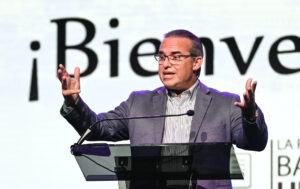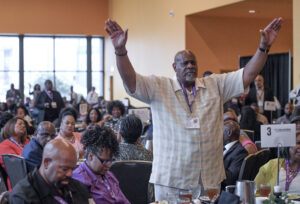
WASHINGTON (BP) — The mainstream media’s focus on support of same-sex marriage outnumbered news stories opposing it by roughly 5-to-1, according to a new Pew Research study showing the influence such coverage could have on the American public.
Nearly half of the stories studied in the two months marked by Supreme Court deliberations on the subject, mid-March through mid-May, focused on support of gay marriage and only 9 percent focused on opposition.
Pew said in its study, released June 17, 44 percent of the news stories included an even mix of support and opposition or were objective. Pew defined support or opposition by mandating that statements expressing that position had to outnumber the opposite view by at least 2-to-1.
All three of the major cable networks, Pew said, had more stories with significantly more supportive statements than opposing, including Fox News.
William Proctor, an evangelical commentator and author of “The Gospel According to The New York Times,” told Baptist Press the research shows the mainstream news media continues to demonstrate a “significant bias against biblical values on social and other issues.”
“But second, and even more important, through a process I’ve called ‘culture creep,’ the values espoused by the media inexorably draw the public away from traditional biblical values and toward moral and social standards that are antithetical to those affirmed by historic Christianity,” Proctor, a two-time Harvard graduate, said.
Proctor pointed to polls by Angus Reid Public Opinion that found as news reports have increased in support of gay marriage, Americans’ opinions have shifted dramatically as well. In 2010, he said, only 36 percent of Americans affirmed same-sex marriage; in 2011 the figure had risen to 46 percent; and now a Gallup poll shows support at 51 percent or higher.
Same-sex marriage supporters in the news coverage had a more consistent message than those arguing against it, Pew found, with supporters focusing on gay marriage as an issue of equality in nearly half of the news stories studied.
Opponents argued that same-sex marriage would hurt society and traditional marriage, but Pew said that argument only appeared in 18 percent of the stories and other arguments included the idea that homosexuality is immoral (10 percent).
“A powerful mechanism through which culture creep operates involves the identification of the wishes of certain interest groups, such as the gay community, with minority ‘rights,'” Proctor said. “As the Pew report noted, ‘the central argument among proponents of same-sex marriage was one of civil rights.’
“Such an argument is especially potent in our society because many Americans have a great difficulty denying anyone’s claim to a special rights status, no matter how far-fetched that claim may be,” Proctor said.
Amy Mitchell, acting director of Pew’s Project for Excellence in Journalism, said the study shows how same-sex marriage supporters had a clear message and succeeded in getting that message across in all sectors of mainstream media.
“In addition,” Mitchell said, “many of the events during the period studied, such as announcements by politicians and state legislation, reflect movement toward same-sex marriage.”
One bright spot for gay marriage opponents, according to the Pew study, is that an analysis of Twitter conversation found that despite the nation’s shift toward acceptance of same-sex marriage, significant opposition remains. Statements on Twitter were closely split between those who supported and those that opposed, Pew reported.
Also of note from the Pew study:
— The Huffington Post had to be considered separately because it produced such a large amount of coverage on same-sex marriage that to include it with the rest of the news media would have overshadowed the results, Pew said. With its ongoing Gay Voices page, The Huffington Post produced 365 stories on the topic during the study period, and 62 percent of those were supportive.
— The five days surrounding the Supreme Court hearings on gay marriage produced the greatest number of related stories, Pew found.
— LGBT news outlets also were analyzed, and Pew said their coverage focused on local and state laws more than mainstream coverage did.
To read Pew’s study on the mainstream media and gay marriage, visit www.journalism.org/node/33731.
In a separate study by the Pew Research Center released June 13, research showed the LGBT community is, on the whole, less religious than the general public. About half of LGBT adults say they have no religious affiliation, compared with 20 percent of the general public.
One-third of religiously affiliated LGBT adults, Pew said, identify a conflict between their religious beliefs and their sexual orientation or gender identity.
About 75 percent of white evangelical Protestants in the general public and 55 percent of all U.S. adults with a religious affiliation, Pew reported, say homosexuality conflicts with their religious beliefs.
“Among all adults in the general public, there is a strong correlation between frequent church attendance and the belief that homosexuality should be discouraged,” Pew said.
A third study, released by the Pew Hispanic Center June 19, found that Latinos’ views of same-sex marriage have changed dramatically in recent years. For the first time, in 2012 more Latinos said they favored gay marriage than opposed it — 52 percent versus 34 percent.
Just six years earlier, 31 percent of Latinos favored same-sex marriage and 56 percent opposed it. The shift tracks with the general public, Pew said, and not all Hispanic groups hold the same view.
Support for same-sex marriage is highest among Latinos with no religious affiliation, followed by younger Latinos, those who identify with the Democratic Party and those with some college education, Pew said. The strongest opposition to same-sex marriage was from evangelical Hispanics.
–30–
Erin Roach is assistant editor of Baptist Press. Get Baptist Press headlines and breaking news on Twitter (@BaptistPress), Facebook (Facebook.com/BaptistPress ) and in your email ( baptistpress.com/SubscribeBP.asp).















